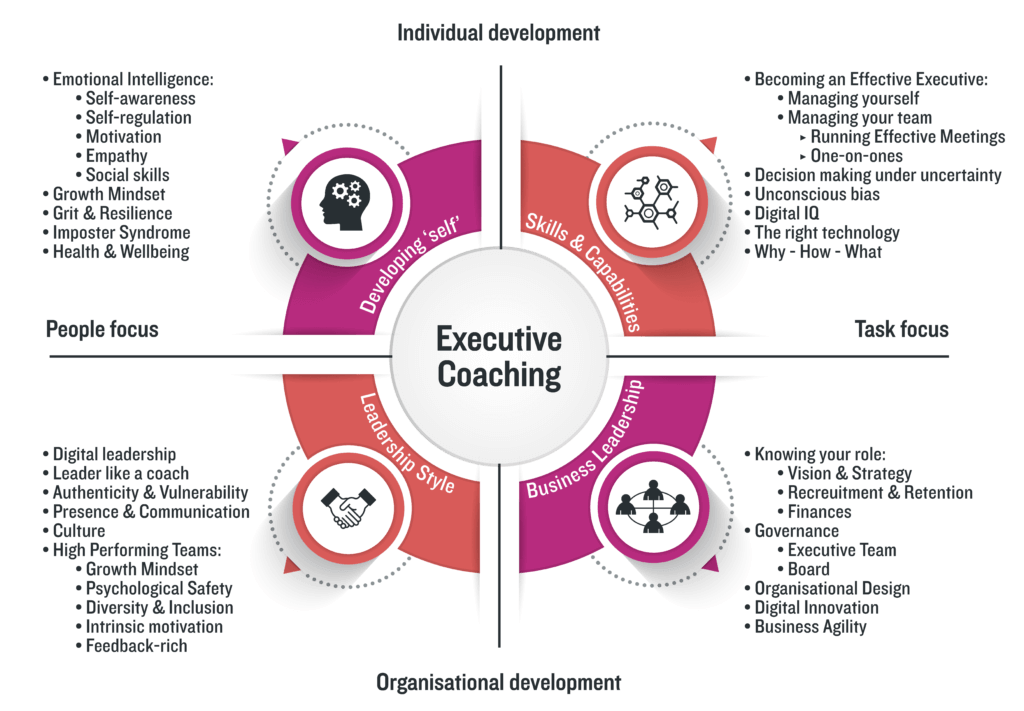At a time when the world is rapidly evolving and challenges are becoming increasingly complex, leadership must be reassessed and adapted. Executive coaching emerges as a powerful catalyst, redefining success standards. It provides leaders with a confidential framework to reflect, develop, and refine their interpersonal communication. Through well-thought-out strategies, it helps them identify their strengths and weaknesses while supporting them in creating a positive and dynamic corporate culture. By adopting this approach, leaders are not only prepared to face the future but also become visionaries capable of inspiring and motivating their teams towards uncharted horizons.
|
IN SHORT
|
In a constantly evolving world, where the professional dynamic is more fluid than ever, leadership must adapt and transform. Executive coaching proves to be a powerful tool, not only for individual development but also for achieving collective goals within organizations. This article explores how executive coaching redefines the notion of success by offering a conducive framework for the evolution of today’s and tomorrow’s leaders.
A space for reflection and learning
Executive coaching creates a confidential environment where leaders can pause and reflect on their practices. In this space of trust, they feel free to explore their strengths and weaknesses, develop strategies to overcome challenges, and improve interpersonal communication. By placing the power of reflection at the heart of their experience, leaders can better understand their impact on their teams and organizations.
Development of leadership skills
Executive coaching is also a catalyst for developing leadership skills. Leaders learn to shape their company’s culture, motivate their teams, and turn visions into concrete actions. Through specific methods, coaching facilitates the acquisition of strategic and technical skills, ensuring that today’s leaders are prepared for the future.
The benefits of leadership coaching for companies
The benefits of leadership coaching go far beyond the individual. Indeed, it fosters organizational success by aligning personal and collective objectives. This process strengthens team dynamics, inspires collaboration, and encourages innovation. In this ecosystem, each member feels valued and motivated, leading to tangible results.
The vision of the executive leader
An effective leader must possess a clear and inspiring vision. Executive coaching helps refine this vision and transform it into a feasible action plan. This enables leaders to think big and take their teams toward ambitious goals. By learning to project an image of the future that resonates with both emotions and reason, leaders become change drivers.
Generative coaching: towards inclusive leadership
Generative coaching focuses on alignment and awareness. It allows leaders to perceive their intentions more clearly and act more effectively. This inclusive model paves the way for collaborative leadership practices, where individuality merges with team spirit, making each leader not only responsible for their own success but also for that of their colleagues.
Measurable impacts on organizational performance
Companies that integrate executive coaching into their development strategy often see a positive impact on organizational performance. By promoting continuous improvement of leadership skills, they manage to adapt to an ever-changing market while remaining competitive. Research shows that leaders who benefit from coaching become not only more effective but also contribute to cultivating a positive and dynamic work atmosphere.
To delve deeper into this fascinating topic, you can discover more information about inspiring figures such as Aude de Thuin, founder of the Women’s Agency and leadership coach, or the enriching interview with Linda Apsley on technological innovation in leadership. These exchanges reveal how coaching transforms the perception of leadership in the current era, where companies must navigate through an ocean of uncertainties.
In short, executive coaching redefines success by creating visionary, engaged, and resilient leaders prepared to lead their teams toward a future where success is shared and sustainable.
“`











